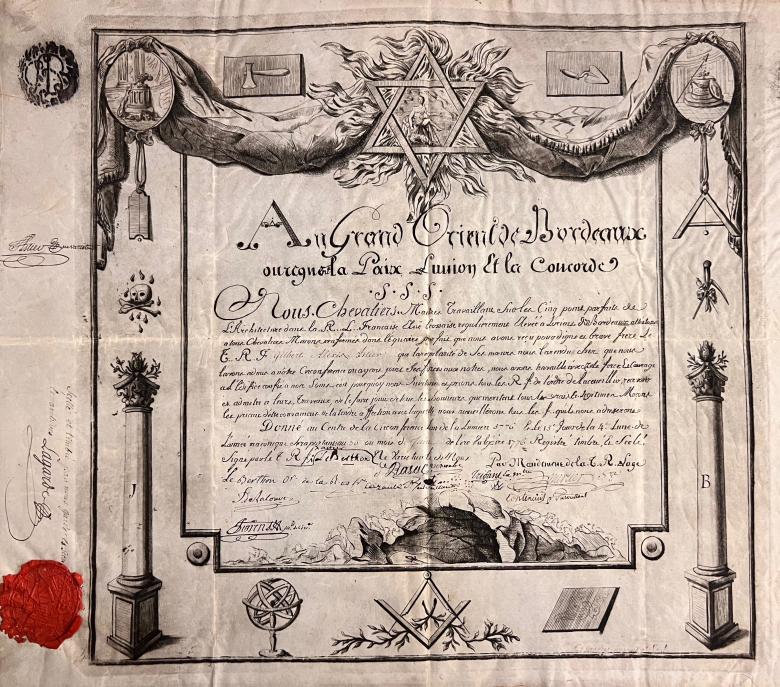Masonic diploma of Bordeaux lodge "La Française"


Some of our latest news
Masonic diploma of Bordeaux lodge "La Française"
Object of this week is a Masonic diploma of initiation of brother Gilbert Alexis Astier of Lyon, issued in the French city of Bordeaux on the 30th June 1776. The diploma is signed by local nobleman Joseph de Gombault de Razac and a number of other intellectuals. It is noteworthy that the diploma was issued by the lodge "La Française", one of the oldest Masonic lodges in France.
The history of the Masonic lodge "La Française" in Bordeaux dates back to 29th August 1740, when it was founded by Catholic immigrants from Britain - Jacobites, supporters of the Stuart dynasty overthrown in the revolution of 1688, after which the Protestant monarchy (House of Hanover and the modern Windsor dynasty) was firmly established in Britain. As the Jacobite movement gained a foothold in Ireland and Scotland, it was emigrants from these regions who were most likely to join French Masonic lodges, especially in the city of Bordeaux, one of the centres of the Jacobite movement. The Jacobite influence was also reflected in the ideology and symbolism of the lodge "La Française": its emphasis was on loyalty to medieval traditions, the monarchy and expressed Christian values.
This period was marked by the significant growth of Masonic societies throughout Europe, which created a platform for dialogue among intellectuals from very different social backgrounds and denominations. "La Française" quickly became an influential and progressive centre in western France, where many opponents of the Protestant monarchy had emigrated from the British Isles.
Among the prominent personalities associated with this lodge is the philosopher Charles Louis de Montesquieu, whose liberal ideas formed the basis of modern democracy and the principle of separation of powers. It is known that in 1777 the lodge "La Française" was visited by the Marquis Gilbert de Lafayette - a hero of the American War of Independence, an associate of George Washington and a famous Freemason. In 1783, the lodge was visited by Italian mystic Giuseppe Balsamo, better known as Count Cagliostro, who went down in history as one of the most famous adventurers of the XVIII century. It is known that Cagliostro spent about a year in Bordeaux, unsuccessfully trying to lure local Freemasons into financial scams, because of which he gained notoriety in French society, and soon afterwads he was arrested.
Over a period of time, "La Française" became one of the main symbols of the union of Protestants and Catholics who, despite their social and cultural differences, developed a common humanistic worldview. To this day, "La Française" remains a classic example of an 18th century Masonic lodge, whose activities are aimed at achieving harmony in society, intellectual pursuits and supra-religious spiritual unity.
According to the available information from French archival sources, most of the brothers of "La Française" were merchants, sailors and officials. The lodge thus served as a cultural and economic bridge between Britain and France. In 1893, "La Française" was renamed as "Nine Reunited Sisters" ("Neuf Soeurs Réunies"), which now falls under the jurisdiction of the Grand Orient of France and practises the Scottish ritual.
 Museum
Museum